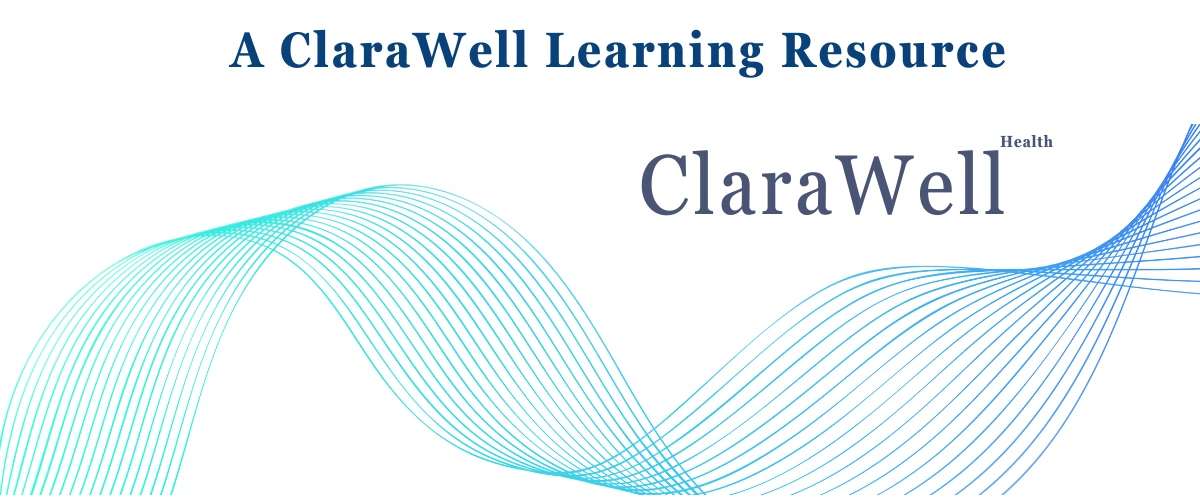Learn with ClaraWell
Circadian Rhythm Disruption

Circadian Rhythm Disruption
How your body clock impacts insomnia and sleep quality
Circadian Rhythm Disruption
Your circadian rhythm is your body’s built-in timer for sleep, energy, and focus. When it’s working well, you feel tired at night, alert in the morning, and steady through the day. But when that rhythm gets thrown off, it can lead to restless nights, groggy mornings, and unpredictable energy. These cards explain how your internal clock works, what can disrupt it, and how to start finding your natural rhythm again.
Take the insomnia screener if you’re ready to reflect on your current sleep pattern.
🕰️ What Is a Circadian Rhythm?
Your circadian rhythm is your body’s internal clock. It helps control when you feel sleepy, alert, hungry, and even when certain hormones rise or fall. This rhythm resets daily, influenced by light, behavior, and timing.
💡 Light: Your Strongest Signal
Morning sunlight tells your brain it's time to wake up. But too much artificial light at night, especially from screens, can confuse your clock and delay sleep. Light is the most powerful tool for realigning your rhythm.
🌍 Jet Lag, Shift Work, and Time Drift
Traveling across time zones, working night shifts, or staying up late often can push your internal clock out of sync. This mismatch can lead to poor sleep, daytime fogginess, and mood changes. Learn more in our guide on what causes insomnia.
🍔 Eating at Odd Hours
It’s not just sleep—your internal rhythm also responds to food. Eating too late or at inconsistent times can interfere with your digestion, hormone cycles, and sleep timing.
⚠️ Signs Your Rhythm May Be Off
If you struggle to fall asleep, wake up groggy, or feel energetic late at night, your circadian rhythm may be out of sync. Some people also notice energy dips in the afternoon or trouble waking at the same time each day. Check for more signs of insomnia here.
🔄 Social Jet Lag
Sleeping in on weekends can feel great, but it can also confuse your internal clock. This shift between your weekday and weekend sleep schedule is known as social jet lag, and it can make Monday mornings feel harder than they should.
⏰ Delayed Sleep Phase
Some people feel naturally tired later in the night and find it difficult to wake early. This is a common circadian rhythm pattern called delayed sleep phase. It’s especially common in teens, students, and creative night owls.
📅 Your Rhythm Can Shift with Age
Teenagers tend to stay up late, while older adults often wake earlier. These changes are a normal part of aging. Understanding how your rhythm shifts over time can help you adjust your routine and support better sleep.
🧘 Resetting Your Clock
You can support your rhythm by waking up at the same time each day, getting sunlight in the morning, limiting screens at night, and keeping your meals consistent. Small changes like these can realign your system gently and naturally.
🧭 Your Rhythm Is Unique
Not everyone’s body runs on the same clock. Some people do better at night, others in the morning. Genetics, lifestyle, and environment all shape your rhythm. The goal isn’t to force a schedule—it’s to understand what works for you and build from there.
When your internal rhythm is in sync, sleep feels easier and more natural. When it’s off, the signals get scrambled. Understanding your body’s clock is the first step toward better rest and balance. Learn more from the National Institute of Health.
Wondering if your rhythm might be out of sync? ClaraWell’s free insomnia screener can help you reflect on your sleep patterns and consider what support might help.
Take the Insomnia Risk Screener